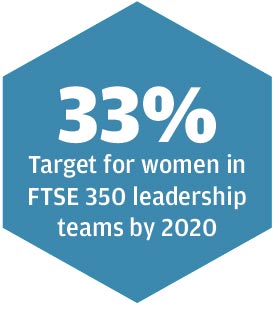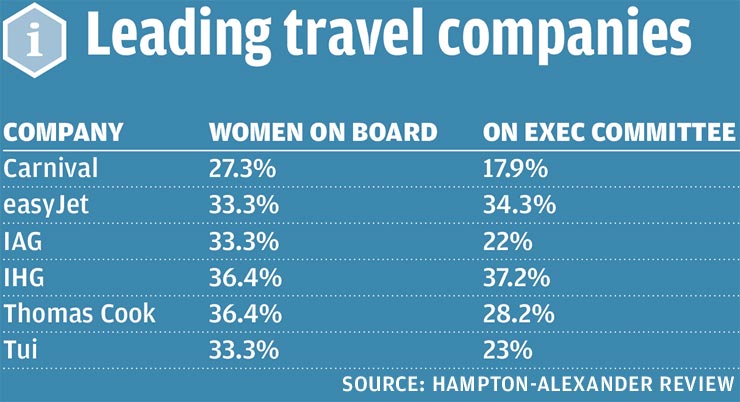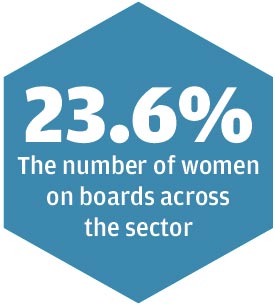The only way is up for gender equality in travel
 Rob Gill
Rob GillMore women are taking up senior positions in travel companies but very few are being appointed to the top jobs, according to a new report backed by PwC and the MBS Group.
The number of women in senior management and board positions in the Hospitality, Travel and Leisure (HTL) industries is increasing, according to a new report. But women are still vastly under-represented when it comes to the very top jobs at leading companies.
The second Women in Hospitality, Travel & Leisure 2020 Review looked at gender diversity across the HTL sector, as well as the number of senior executives within these industries from a Bame (black, Asian, minority ethnic) background.
The new report, which involved interviewing and analysing data from 120 companies, has been led by Tea Colaianni, chair of WiH2020, which is an independent HTL diversity organisation backed by firms including PwC and The MBS Group.
There is now an average of 36% of women working in the HTL sector who report directly to their organisation’s executive committee, while just over a quarter (25.4%) of those on executive committees are currently female.
But the number of women on boards is only 23.6% across the sector, and this is even lower (18.2%) for non-listed companies.
“Our 2019 report highlights that the progress made so far is encouraging,” says Colaianni.
“The sector is making great strides towards the target of 33% women in FTSE 350 leadership teams by 2020 and there are signs that momentum is being built in a sustainable way.
“However, it is also clear there remains a great deal of work to do. Over the last year, the gap between companies performing well and those that still have a way to go has widened.”
The report says there is a “severe lack of women in key leadership roles” across the sector in both listed and private companies. It adds: “While overall trends for diversity at board level and in senior leadership roles are improving, this is not reflected in the key roles of CEO (chief executive officer), chair and CFO (chief financial officer), where progress has been poor.”
This is highlighted by the fact that only 7% of CEOs at HTL companies within the FTSE 350 are female, while there are no female chairs of these companies. The situation is slightly better in the non-listed sector where 11% of CEOs are women. Only one in 33 HTL leaders are from a Bame background.
Jon Terry, diversity and inclusion consulting leader at PwC, stressed: “It’s important that leaders within your business reflect the diverse make-up of your staff and customers.
“Without this diversity, you’re likely to miss out on a vital element of customer and employee understanding, and your performance will suffer as a result. In turn, diversity and inclusion are important in shaping brand perception, customer choices and your ability to attract key talent.”
Gender pay gaps
Analysis by PwC in the report shows women working in travel are facing a larger median gender pay gap (22%) than the UK economy as a whole (14%), as well as in the other parts of the HTL sector, where the gender pay gaps are only 7% for hospitality and 10% for leisure.
“A key driver is the under-representation of women in senior positions and technical posts such as airline pilots,” says the report. “The demands of the sector also put pressure on work/life balance and make it hard for people with caring responsibilities.
“For some in the sector, there is an additional layer of complexity that can impede progress: trade unions. Particularly in travel, some companies report that it is difficult to drive change and adapt working practices that could boost diversity due to resistance from trade unions who are nervous of opening the door to other changes.”
But new reporting rules on gender pay gaps may help to narrow these differences between male and female employees by putting pressure on HTL companies who have large pay gaps.
“Since our last report, the emergence of mandatory gender pay gap reporting has helped to ensure the issue is pushed up the agenda, even for non-listed businesses who have, until now, been under less public scrutiny,” says Colaianni.
The way forward
The report includes interviews and case studies from key figures working for leading HTL companies – such as Bourne Leisure, easyJet and InterContinental Hotels Group (IHG) – talking about what measures they are taking to increase the number of women in senior positions.
It also looks at how WiH2020 is working with companies in the sector on various projects or “streams” to improve the situation for women. These include establishing “female talent pools” to help support career progression, setting up cross-industry mentoring, and creating guides for best practice.
One of the stream leaders is Suzanne Peacock, group talent and development director at Merlin Entertainments. She says: “The challenge is one of both attraction and retention. We need to attract more female talent to the sector and stop losing valuable talent to other industries by demonstrating the HTL industry is a great place to work and that it is possible to have a fulfilling career.”
Another initiative is the Women Returners Programme, which aims to address typical barriers to women going back into the HTL sector after a career break. Already, 15 companies have signed up for the programme, which will include both face-to-face and online training.
The report is optimistic that positive change is happening, although everybody is agreed that there is “a lot of work still to do”.
“Change is happening,” says Colaianni. “However, a sustained and systematic focus is still required, especially on all aspects of recruitment, development and retention.
“The progression of women remains a key objective, coupled with an emphasis on creating an environment in which all talent can thrive, leadership stereotypes are challenged and individuals are valued for their skills and capabilities.”
Elliott Goldstein, partner at The MBS Group, adds there are “plenty of green shoots” and argues thinking differently about recruitment is one of the “key drivers of progress in diversity”.
“An ever-increasing number of women at direct report and non-executive levels means there is an exciting new talent pool to draw leaders from,” he says. “Perhaps more excitingly, today we can point to inspiring female role models across virtually all functions within the HTL sector.”
To spread the message further, WiH2020 will be holding a series of five masterclasses from March to June 2019 focusing on different diversity topics.
Sign up for the inaugural TTG Diversity & Inclusion in Travel conference at the QEII Centre in London on Wednesday, July 3, 2019. For more info, visit the TTG Diversity & Inclusion in Travel conference site here.
Sign up for weekday travel news and analysis straight to your inbox

Rob Gill
Supplier Directory
Find contacts for 260+ travel suppliers. Type name, company or destination.
















